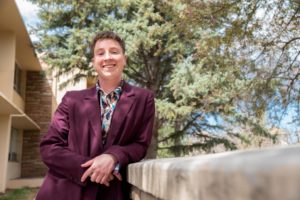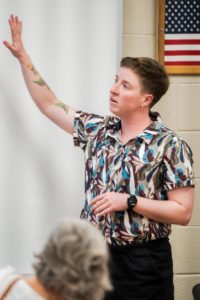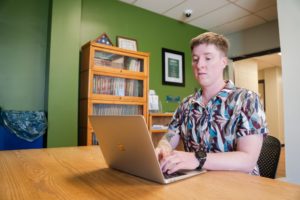
From Patagonia to Fort Collins, behind every endeavor that Colorado State University social work doctoral student Quinn Hafen has embarked upon is a search for fulfillment and impact.
Teaching English in Patagonia, working as a sommelier, canvassing for a clean energy group, and working at the Fort Collins Bike Co-op all taught Hafen something along the way: the importance of community, equity, and listening instead of prescribing.
Since discovering social work, Hafen has leaned into work around dismantling whiteness and other power structures from the field.
“I’ve continuously grappled with how to be white and do social justice work,” Hafen said. “Instead of running from the power dynamics, it feels like I am finally sitting down and saying to myself, ‘This is what I see happening, these are my reflections, this is what the literature says, and here’s what I’m going to do.”
Hafen recently had an article published in the Journal on Social Work Education. The piece, titled Critical Whiteness Theory and Social Work Education: Turning the Lens Inward, considers the profession of social work’s role in maintaining white supremacy.
Discovering Social Work
 Hafen started their undergraduate studies in anthropology at Northern Arizona University. After taking a class on indigenous perspectives in anthropology, Hafen had a reckoning with anthropology as a discipline entangled with challenges around race, equity, and othering.
Hafen started their undergraduate studies in anthropology at Northern Arizona University. After taking a class on indigenous perspectives in anthropology, Hafen had a reckoning with anthropology as a discipline entangled with challenges around race, equity, and othering.
“Maybe I should be a teacher,” they thought.
Hafen went to Chile to teach English at a polytechnic high school in Patagonia, then to Santiago to teach English to business people. Wanting to stay in South America and try something new, they began working as a sommelier.
“All of that was fun for a while, but wasn’t very fulfilling,” Hafen said of their time in Chile.
After four years in South America, Hafen settled in Fort Collins to be closer to family in Colorado.
They started canvassing for a clean energy non-profit, but it “felt like we were knocking on doors to knock on more doors, rather than make a real impact.”
They moved on to work for the Fort Collins Bicycle Co-op as the Latinx Program Coordinator via a grant funded by the Bohemian Foundation. That led to another opportunity to support residents of a mobile home park with active living.
“That felt super meaningful to me, because it was finally on the path that I wanted to work on,” they said.
Hafen worked with a resident coalition to build a playground, install a new stoplight on North College Avenue, and other initiatives.
“The active living program was completely resident driven. I did not decide what we were going to do, all I did was coordinate and assist them,” they said.
A turning point
Hafen said that was a turning point in discovering the next step on their journey.
Continuing the search for impactful community work, Hafen applied to the MSW program at CSU.
“The first year of the MSW program was a real eye-opener for me,” they said. “I hadn’t learned this much about privilege and oppression – it totally blew me away.
“For a long time, it felt like I wasn’t seeing the reality of a situation, I was seeing what I was taught to see,” Hafen said. “Social work started to open that up and say ‘hey, things aren’t actually the way you think they are.’”
Hafen’s eyes had been opened to things they “were curious about but didn’t understand.” Things such as how redlining keeps families of color out of homeownership, segregation in schools, and cultural pressures to dress and present in certain ways.
“It felt like ‘once you see something clearly, you can’t turn away,’” they said.
Continuing to a Ph.D.
During the MSW program, Hafen worked with Assistant Professor Elizabeth Kiehne on establishing a legal defense fund for the immigrant community in Northern Colorado.
“Elizabeth asked me what I wanted to do after my MSW, and I was not sure. I told her I wanted to keep doing what I was doing, and she said ‘well, why don’t you get a Ph.D.?” Hafen recalled.
Hafen had found the work that mattered to them.
“I’ve always enjoyed being able to dig into the literature and find an answer or potential explanation for something,” they said.
Recognizing challenges
 Hafen had discovered social work, but like anything, it was not perfect. Associate Professor Paula Yuma asked Hafen to help with a needs assessment for the school – a cultural audit conducted to examine the role of whiteness and gather feedback from employees and students to make the school a more equitable and just place.
Hafen had discovered social work, but like anything, it was not perfect. Associate Professor Paula Yuma asked Hafen to help with a needs assessment for the school – a cultural audit conducted to examine the role of whiteness and gather feedback from employees and students to make the school a more equitable and just place.
“It’s been really interesting to think about our school community and how we’re pushing for change and what’s effective,” Hafen said. “I found myself being more and more drawn to working within social work instead of working outwards.”
Addressing whiteness in social work education
When working on a paper about allyship, Hafen ran into “a lot of critiques on how allyship is not enough, and that people need to put their own power and privilege on the line. Not just help where you can and get some recognition for it.”
This critique led Hafen deeper into literature around white privilege, which steered them to finding critical whiteness theory. They noticed that critical whiteness theory was nearly absent from social work education scholarship and wanted to fill that gap to help make social work more equitable and just.
Hafen says that often when we think of race and racism, “we think of the detriments to people of color instead of thinking about the system that keeps it in place.” They describe this as “downstream thinking” of systems of oppression.
Critical whiteness theory flips that perspective “upstream.”
“It is turning back the other direction and saying, ‘we all engage in whiteness and actions that create this network and privilege and power, and we need to look at how we can change this collective sustenance of whiteness as a system,” Hafen said. “Instead of saying ‘they have it bad over there, what should we do about it?’”
“I want to challenge the narrative of ‘empowering others,’ because that would mean that I have the power and I’m giving it to someone else when really, I’m hoping to step away from it and dismantle these power structures,” they said.
By publishing this paper, Hafen hopes to spur more conversation around critical whiteness theory in the social work academy and encourage others to develop more knowledge on how to improve social work as a discipline.
Through their dissertation work, Hafen continues to explore how the social work academy can divorce from white supremacy. They are currently writing a systematic review on interventions that can be used to achieve this and will explore these interventions at the School of Social Work.
To bring this work to a wider audience they have been selected to join the Student Advisory Board for the Group for the Advancement of Doctoral Education.
“I want to question things to come to a better understanding – to be able to see a bit clearer.”
The School of Social Work is part of CSU’s College of Health and Human Sciences.